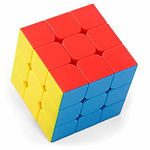THE WORLD IS "PERFECT": An Interview with Lao Tzu
- Oct 13, 2021
- 4 min read
Updated: Nov 4, 2021

The Tao Te Ching is one of the world's oldest books of wisdom, written in China about 2,500 years ago by a mysterious figure simply referred to as "Lao Tzu" — a name that translates into English as "Old Master." Using methods that will remain undisclosed, I was able to interview Lao Tzu to ask him about the most controversial lesson of the Tao Te Ching and its meaning for today.
-----
JGC: Master Lao, if that's what I may call you, it's an honor to interview you.
Lao Tzu: My friend, you can call me by whatever name pleases you. As a student of my teachings, I trust you know that neither of us, nor the Tao itself, has any real name. "When things are given names, divisions are made, and understanding becomes fragmented, but when names are removed, what is underneath regains its dignity."
JGC: Indeed, and thanks for jogging my memory. Now, if I may, I'd like to ask you about a passage in the Tao Te Ching that doesn't sit well with many people, particularly in modern times. In verse 29, you teach us:
"The world is continually changing, yet constantly perfect.
It cannot be improved with your small efforts.
With larger efforts, it can be destroyed."
Lao Tzu: Our times are not so different, my friend. For while human technology may change, the follies of human nature spring up from the same eternal source today as they have since time immemorial. But please tell me why your ears have trouble with this verse?
JGC: With all due respect Master Lao, how can you use the "perfect" to describe a world with so much violence and suffering; a world that bleeds from the ever-open wound of social injustice; a world in which diseases kill millions of people every year, including young children? Is that your idea of perfection?
Lao Tzu: My soul, like yours, weeps for the suffering that results from the world's tragedies. The difference between us, however, lies not in that which we consider 'perfect,' nor that which we deem "suffering." The difference between us, my friend, is in our expectation that the world can be any different than it naturally is.
Would you expect a lion to eat anything other than the flesh of another animal? Or for fish to be able to breathe out of water? How easy it is to forget that human nature is just as much a part of the natural world ─ just as much an expression of the Tao ─ as the instinct of trees, the diet of carnivores and the movement of tides.
JGC: I recall a similar explanation from Gautama Buddha: that nothing is inherently good or bad, but our attachments and expectations are what make them so. But Master Lao, can you explain your position a bit more?
Lao Tzu: Does a perfect circle appear flawless to the man who has suffered a brain injury? Does a peerless lover appear ideal to her who has just had her heart broken? Have you ever considered that it may not be the world that is imperfect, but rather your perception of it?
JGC: Master Lao, you make a fair point, but do you really believe that we're incapable of improving the world and that we will "destroy" it if we try too hard?
Lao Tzu: My friend, "the Earth is a sacred vessel of spider webs and the wings of butterflies. If you try to use it, you will crush it. If you try to change it, it will shatter."

Are not your history books filled with examples of despots and führers, tyrants and cult leaders, that each sought to eradicate the world of its imperfections as their eyes perceived them? Have you not been taught that the proverbial road to hell is paved with good intentions? Do any two people agree on the exact changes that should be made in the world? Or how to make those changes?
JGC: I think I understand. A few years ago, there was a picture of a dress that had the internet abuzz because people couldn't agree whether the dress was black and blue or white and gold, and that was just a simple picture, not a complex problem stemming from the timeless flaws of human nature.

But if what you say is true, that the world cannot be improved with our "small efforts" and that with "larger efforts, it can be destroyed," should we then give up helping others? Should we forget about compassion?
Lao Tzu: Can you ever be sure that the changes you seek to make in the world are the right changes? Too often, when people seek to change the world or make the world a better place, they are being driven by their ego, not by their heart. Their primary intention is to acquire attention, not to reduce suffering and this leads to resistance and resentment instead of cooperation. My friend, remember what I have taught:
"Filled with ego is not the Way."
I teach people to see the world as 'perfect' because if the world is already perfect, it doesn't need your help ─ help that is really serving your own ego, not the betterment of those around you. So instead you can direct your efforts on improving the world by focusing on the only thing you can truly control: yourself.
Among those who have followed this path there is a saying:
"Evil cannot be conquered in the world... it can only be resisted in oneself." ¹
Only when you know the Tao will you come to understand: this is the Way.
-----------------------------------------
Note: The passages of the Tao Te Ching in this article are excerpts from Benjamin Hoff’s 1981 translation in “The Way to Life: At the Heart of the Tao Te Ching.”
Footnotes:
1. Schlitt, R. (1973). Kung Fu.

Comments